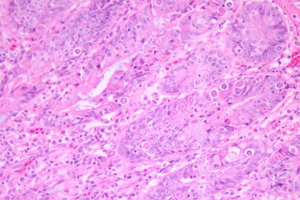Breakthrough in fight against deadly chicken disease

BBSRC-funded researchers at the UK”s Royal Veterinary College (RVC) are a step closer to finding a new cost-effective vaccine for the intestinal disease, coccidiosis, which can have devastating effects on poultry production.
Chickens are the world’s most popular food animal and global poultry production has tripled in the past 20 years. The world’s chicken flock is now estimated to be around 21 billion, producing 1.1 trillion eggs and 60 billion broilers (90 million tonnes of meat) every year.
Coccidiosis is caused by protozoan parasites of the genus Eimeria, closely related to the parasites that cause malaria in humans. The infection affects chickens’ intestines and if not controlled has extremely high morbidity and mortality rates.
Domestic chickens can be infected by seven species of Eimeria, each colonising a preferred region of the intestine causing symptoms of differing severity. In a decade-long collaborative research project, biologists at the RVC have helped produce full genome sequences of all seven of these species.
This is major breakthrough for the poultry production industry in its fight against coccidiosis, which puts the global economic cost of infection at around £1.8Bn. This is mainly due to production losses combined with costs of prevention and treatment.
Coccidiosis affects all livestock but is particularly hurtful to poultry because of the high density that chickens can be housed in during the production process. Eimeria species that cause coccidiosis have a direct faecal-oral life cycle that is ideal for spreading rapidly through susceptible hosts when housed in close quarters.
These parasites are also particularly devastating because they survive for long periods in environments such as faeces and litter. This means most chicken flocks in the world are exposed, with many inevitably becoming infected. Drugs are commonly used to control the parasites, but resistance evolves rapidly and there is a continuing need to develop new, effective control of disease.
The RVC’s Head of Pathology and Pathogen Biology, Professor Fiona Tomley, and senior lecturer in Parasitology, Dr Damer Blake are co-authors of the research which is being published in the academic journal, Genome Research.
Prof Tomley said: “Understanding the genetic code of Eimeria parasites will help in the race to develop new therapies for coccidiosis. With poultry production expansion predicted to continue for at least the next 30 years, and with Africa and Asia accounting for most of this growth, developing a new generation of cheap effective vaccines against coccidiosis will be a major contribution to global food security.”
The research is being published in the academic journal Genome Research and is funded by BBSRC.













